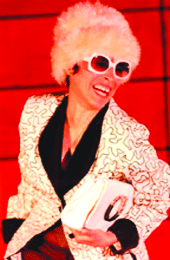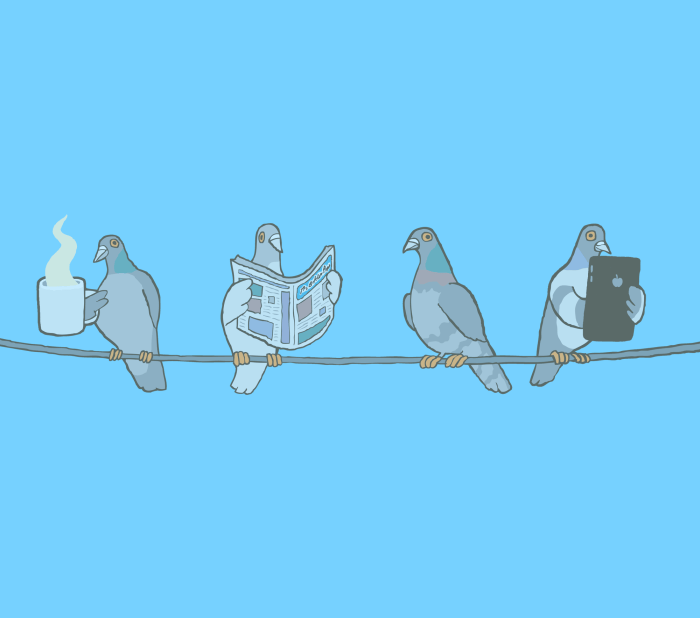Marga Gomez is joined by her late parents in “Los Big Names”
They say you can never go home, and when openly lesbian comedian Marga Gomez returned from L.A. to discover the house she grew up in was gone, this idiom became literal.
Gomez was the only child of Willy Chevalier and Margarita Estremera, two big stars in New York’s Latin scene in the ‘60s, and she worked to become a successful lesbian comedian B.E.—before Ellen. In her new one-woman show “Los Big Names”—the first off-Broadway solo show by a Latina lesbian—she charts her tumultuous life and career, pays homage to her parents, and finally finds a place for herself.
Gomez plays herself, her father, and her mother, and tells the story of her parents’ desire to be known internationally as “Los Big Names.” She confronts the false reality that covers the truth, and comes to peace with both.
Having famous parents was no picnic. Because they never left the house until after dark, and always wore sunglasses, her neighbors suspected them of being vampires, and kids beat her up on the way home from Catholic school.
Her parents were often on the road, and she admitted they “didn’t instill any working-class socialist values in me; they were totally into this crazy American dream of being rich and famous….But I liked the attention my parents got. The only thing wrong with it was that I was not getting the same amount of attention.”
“I felt that I really was a star and nobody was realizing how talented I was,” said Gomez. “I couldn’t sing, I couldn’t dance, but I just felt that I would be a bigger star than my parents.
“I do think that I’m genetically disposed to being an entertainer. I do have some skills that are inherited from my parents. One thing is, I’m not afraid to be on the stage; I’m really happy there, I’m meant to be there.”
In the show, Gomez recounts her first brush with fame—a walk-on role in her parents’ skit, “Le Divorce Gramatico.”
“The joke was that the couple was fighting over custody of their baby, and my little bit part was to walk the baby on stage, which was the Chihuahua,” she said, adding that the dog, with its “perpetual partial boner covered by carpet fuzz” made her gay.
In the skit, her parents divide possessions according to the gender rules of Spanish grammar; she gets la casa, and he gets el bebe. In the real world, Gomez’ parents divorced when she was 12 years old.
When her parents ask her to choose favorites, she picks her mother, and is rewarded with a picnic. Young Marga drops the grocery sack full of picnic food, and her mother gives her a public dressing down on how to be a lady. This heartbreaking scene illustrates how Gomez dealt with not living up to her mothers’ expectations of being “this little Puerto Rican Barbie that she wanted.”
Instead, she got “a rough, butch, dark-haired, dark-skinned baby” who preferred cowboy outfits to the “little dresses at the time for Latina girls [that were] were so painful, because they were all scratchy, they had crinolines, and needed all this wide clearance.”
Gomez’s parents knew she was a lesbian, but that even then, there was, she said, a sort of “Don’t Ask, Don’t Tell policy with Latino families; families in general I think. In Spanish show business, there were so many lesbians and gay men and trannies, and there was this system that yes, we know, but we’re never gonna speak of it.”
Eventually, the jig was up when Marga’s father caught her at age 19 “making sweet love” to another girl.
Gomez recreates the conversation she envisions might have followed, giving her parents “a last chance to have a little tenderness, have a laugh, hear each other’s voice… So something that was really a bad day for me, I make it a good day in this piece. Part of this show is mixing what happened with what I wish happened.”
From her father’s invented stage name—taken from Maurice Chevalier—to her mother’s insistence that she is from Chile rather than Puerto Rico, inventing a better reality has been a strong force in Gomez’s life. In her version of reality, a real priest marries her parents, and neighbors throw flowers onto their patio, not bottles.
When she leaves New York after her father’s death to follow her dream, fantasy butts heads with reality. Even the “Latino Explosion” of Ricky Martin and mojitos cannot overcome the limited roles Hollywood has for Latinas—maid, whore, drug dealer, or unwed mother.
“But unfortunately the goal, the carrot dangling before all of us in showbiz is movie and TV, because that’s where you have that strange psychological need to be loved by everybody, to be known—not to mention all the fucking money you can get,” said Gomez. “So when I went to Hollywood, I don’t know if I did it really pragmatically, if I had any kind of logical, realistic business plan, or if I just did it because I had this fantasy that it was my destiny.”
In “Los Big Names,” there is a hilarious scene in which she recounts auditioning for a maid role with Kathleen Turner, who wears a safari outfit. Gomez admitted, “The only reason I went for this audition to Kathleen Turner’s office was because I had a huge boner for her ever since I saw her in ‘Body Heat’, which was the first time I ever saw somebody get it from behind.”
In the show, she riffs, “I never will be ready to play bullshit Latina stereotypes. My parents didn’t raise me to do that—or anything….”
She finally landed a walk-on role in the sci-fi flop “Sphere,” where she delivered some muffins to Dustin Hoffman, Samuel L. Jackson, and Sharon Stone, and along with co-star Queen Latifah, is killed in the first 30 minutes, because, “they always kill the lesbians of color first.”
Gomez said the film languished because, “there were some problems with the end… and the middle…and the title was hard to pronounce.”
During filming, her mother was dying of Alzheimer’s, and after the film came out, she was canned by her talent agency, Creative Artists Agency.
She returned to New York, intent on buying her childhood home.
“Then the house was gone, and I had to deal with that, and I thought, I’m just gonna do what makes me happy,” she said.
Since that time, Gomez has honed her craft as a Latina lesbian comedian. But, she pointed out, “Los Big Names” is more of a memoir than a comedy.
“For all the goofy, wacky stuff in it, the show is a celebration of the creative spirit,” said Gomez. “That’s what gave my parents the greatest happiness, and what gives the people we know in the downtown queer culture scene—in the biz called show—a reason to keep pushing on when you see half-wits getting all the money on TV. That’s what the show is about—the performers.”
gaycitynews.com



































